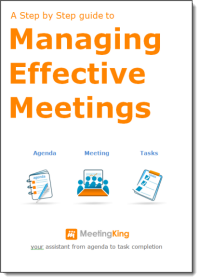
Meetings are an essential part of the work environment. We regularly attend different types of meetings, such as brainstorming, decision-making, or problem-solving.
In this article, we would like to focus on ad hoc meetings: what they are, when to hold them, if they require agendas and follow-ups, and how MeetingKing can contribute to their success.
What are ad hoc meetings?
Ad hoc meetings, also known as impromptu or one-off meetings, take place outside of your regular schedule. They focus on addressing a specific topic, issue, or need.
These impromptu meetings are especially important when something uncommon happens, like an emergency or crisis. They could also be helpful for spontaneous brainstorming, last-minute project revisions, adjustments to workload, and similar situations.
However, ad hoc meetings should not be overused. Hold them sparingly to avoid the disruption of workflow and lack of productivity and motivation.
When ad hoc meetings are required?
Generally speaking, no matter if you work for a big business, non-profit, school, or any other organization, you will have recurring meetings. You might have weekly update sessions, monthly team gatherings, or maybe a formal quarterly board meeting.
Ad hoc meetings could be called for:
- Unexpected situations. Something that requires an urgent decision or action that cannot be delayed until an ordinary meeting, like a data breach.
- Irregular events. For example, a business anniversary or a fundraiser.
- A sudden opportunity. For example, you are traveling to a place for a particular reason and one of your partners is also located there. In that case, it might make sense to reach out and meet to strengthen ties.
Do ad hoc meetings need an agenda?
These impromptu meetings usually happen last minute and are unplanned. For this reason, they typically do not have an agenda. Though it depends on the purpose of the meeting and the time you have to prepare for it.
That is to say, preparing even a brief agenda has great benefits for ad hoc meetings. It provides direction, sets expectations, and makes the whole meeting more productive and effective. Moreover, if you send the agenda to the participants beforehand, they can come prepared, which saves time.
Depending on the goal and the desired result, your agenda for the ad hoc meeting could include questions you need to answer, problems you need to solve, discussion topics, or anything else relevant to the situation.
Do ad hoc meetings need a follow-up?
Some ad hock meetings do not require any follow-ups, while others might need a follow-up meeting to examine the outcome or to collect feedback. However, all meetings benefit from a summary email that includes decisions and action items that you determined in the meeting and lists the people responsible for each action item.
How can MeetingKing make your ad hoc meetings a success?
MeetingKing software makes it easy to manage, structure, record, and follow up on your meetings. You can prepare the agenda, take meeting minutes, share documents, assign tasks, and much more. All you need is in one place!
You can easily test all MeetingKing features with our FREE 30 days trial.
In our next post, we will go into more detail on how you can make your ad hoc meetings more productive.
__
The image above by Drazen Zigic on Freepik


